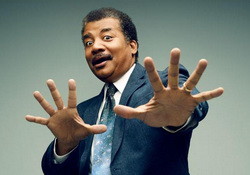
“What is the meaning of life?” This weighty question was addressed by a 6-year-old boy to Neil DeGrasse Tyson.
When a speaker, even one such as America’s favorite astrophysicist, calls for questions, it’s unlikely that he expects to field one of mankind’s oldest and most enigmatic puzzles – much less from one so young as 6-year-old Jack.
Jack is no ordinary child if six-and-three-quarter years. His mother wrote that after Christmas this year, Jack was struck with existential angst. She found him crying, and could only get him to say that something was missing. Prompted further Jack said:
“We don’t even know… why anything is real! We don’t know what reality is. We don’t even know why we exist!” Jack’s mother says she stammered, “Jack..!” I felt like I’d been punched in the solar plexus, “you’re talking about The Meaning of Life! Is that what’s missing?” “YEAH!” he cried, distraught still, but comforted somewhat by having been understood.
A family friend donated tickets to see Jack’s idol, Neil deGrasse Tyson, and the rest is history. Without Jack’s curiosity and bravery we wouldn’t have this beautiful answer to a universal question.
Here is the transcript:
So — what is the meaning of life? I think people ask that question on the assumption that ‘meaning’ is something you can look for and go, ‘Here it is, I found it. Here’s the meaning. I’ve been looking for.’ That scenario, however, doesn’t consider the possibility that ‘meaning’ is something you create. You manufacture it for yourself and for others.So when I think of ‘meaning’ in life, I ask, ‘Did I learn something today that I didn’t know yesterday, bringing me a little closer to knowing all that can be known in the universe?’ If I live a day and I don’t know a little more than I did the day before, I think I wasted that day. So the people who, at the end of the school year, say ‘The summer! I don’t have to think anymore!’ — I just don’t know. To think brings you closer to nature. To learn how things work gives you power to influence events. Gives you power to help people who may need it — to help yourself and your trajectory.
So when I think of the meaning of life, that’s not an eternal and unanswerable question — to me, that’s in arm’s reach of me everyday. So to you, at age six-and-three-quarters, may I suggest that you explore nature as much as you possibly can. And occasionally that means getting your clothes dirty because you might want to jump into puddles and your parents don’t want you to do that. You tell them that I gave you permission.